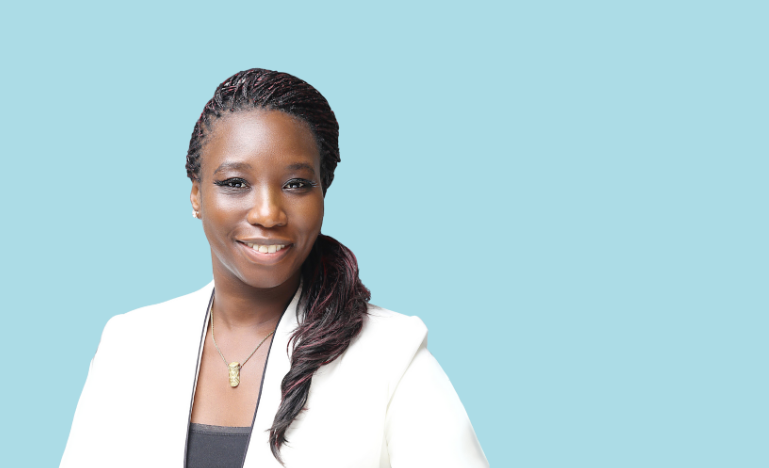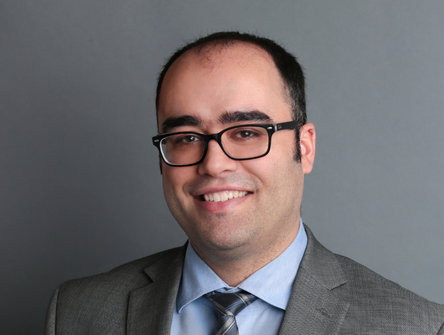A life outside the box
How Angela Ogang went from being displaced to being a successful Canadian lawyer

The logo of Angela Ogang’s practice, AngeLAW, is a conscious act of self-protection.
The downtown Toronto sole practitioner says, “Discrimination is real,” and does not want her last name to deter clients.
The logo also reflects her journey of self-discovery.
For a long time, Ogang, who serves as communications officer for the CBA’s Women Lawyers Forum, tried fitting into boxes defined by others. It’s why she left a small space open in the rectangle that frames her name on that shingle. It reflects how she shines best when she makes space for herself outside any box.
Those who have heard Ogang’s story in the special podcast mini-series on the 30th anniversary of the CBA Touchstones for Change, Equality, Diversity and Accountability Report would likely agree.
She is one of four girls in a family that moved many times to find a place they would all feel safe. Her parents fled political instability in Uganda in the 1970s and met in Kenya years later. Her father was an activist and her mother was a student. Like many migrants fleeing to Kenya, they were both exiled.
Ogang was born in the Ivory Coast, and it’s where she recalls feeling most at home. She also spent two years in Burundi before further civil instability forced her family out. Eventually, they settled back in Kenya. Each time, Ogang felt the pain of leaving friends and her identity behind.
Having her life impacted by outside forces, including the civil war in Rwanda, left Ogang longing for stability. She found it in her parents’ perseverance and their insistence that their daughters be well-educated and well-traveled. Her father, who became a diplomat, allowed them to spend time in many countries and learn to appreciate different cultures. Ogang also came to understand that borders represent access but also limits.
At 11, Ogang went to a boarding school in the French Alps. Her student visa allowed her to explore a newly integrated Europe. She understood how much better the world would be if everyone could travel freely without borders in an open exchange of culture and knowledge.
It wasn’t until her final years at university that Ogang understood the limits of her freedom.
“As much as I could see all these positive changes in Europe, I could also see the door closing in on me because I wasn’t European,” she says.
Losing her ability to travel due to an expired student visa added to her already heightened sense of justice, acquired throughout a childhood marred by displacement.
It also cemented her interest in immigration law.
Ogang obtained a diploma in French legal studies, a bachelor’s degree in law of laws in English and French law, a master’s in corporate and commercial law and a certificate in English law from the London School of Economics.
Her education never shielded her from the racism she faced as an African woman living in Europe, however. Ogang soon realized how difficult it would be to start her legal career there.
Her sisters had moved to Canada, and she knew she could benefit from family reunification programs. Her parents had begun the process of applying for permanent residency in Canada, so it was a natural move for her. In 2005, at the hopeful age of 25, she moved to Montreal to launch her career as a lawyer.
Ogang landed an interview at a local firm and was optimistic about the opportunity. She thought it was the job of her dreams, but had no idea how disenchanted she would become.
She remembers how big the firm’s offices were and how they exuded success. It was precisely what she’d moved so far to find.
However, before the interview even began, she was told she couldn’t practice in Canada. That was her introduction to the big hurdle international law students and lawyers face here — the National Committee of Accreditation. Part of the Federation of Law Societies of Canada, it assesses the education and experience of those who’ve obtained legal credentials elsewhere to ensure they understand Canadian law.
Ogang recalls feeling as if someone had suddenly shoved a big stick in the wheel of her bicycle. She couldn’t believe her education didn’t mean what she thought it did.
“I was seriously depressed,” she says, adding that it felt like she had to start all over again.
“I had a master’s at that point, but it didn’t mean anything.”
Given that Ogang had spent more time studying English common law, she was advised to move to Ontario to have a better shot at getting things off the ground. She started the NCA process in 2006 while working at a Toronto not-for-profit to support herself. She was overqualified for the jobs she could get and underqualified for those she wanted.
“You feel exploited, but at the same time, you feel invisible,” Ogang says.
In 2009, she took the Ontario bar exams and passed. She spent weeks searching for an articling position, and the more applications she sent out, the less she seemed to hear back from firms. This was problematic, as the NCA process requires students to complete their articling hours within a set time, or else all credits expire.
It was another knock to her journey that felt too great to overcome.
A visit from her father made Ogang realize she needed to spend time at home. She returned to Kenya for the first time in nine years, hoping to find peace and leave the law behind. Instead, she found renewed purpose.
“It made a huge difference because it got me out of the little box that I thought I was stuck in,” Ogang recalls.
Inspired by the uplifting community around her, she took the Kenya bar exams and passed. Then, she rallied a group of students to sue Kenya’s Counsel of Legal Education for discrimination for preventing students who went to school outside that country from registering for the bar exams. They won.
Ogang returned to Canada, and in 2018, was called to the bar in Ontario. Finally, she got the recognition that she could be successful in Canada, too.
Following the ceremony, she was walking in downtown Toronto with her family, holding her niece’s hand, and came upon a group of young Black kids. They looked at her in her robes and were dazzled.
“In that moment, I realized that they were impressed because they didn’t see many Black people in robes,” Ogang says.
“To them, that was a novelty. To me, it was like, what is wrong with our system?”
Moments like this are why, in addition to growing her practice in business, immigration, and wills and estates, Ogang prioritizes advocating for inclusivity in the legal profession.
Kamaljit Lehal, an immigration lawyer and mediator who has worked closely with Ogang inside and outside the CBA, calls her a trailblazer.
“Other women lawyers in the same situation as Angela see her creating the support network, moving up and doing things they have hoped for themselves,” she says.
“It gives that light and encouragement to others.”
Ogang says these days, she feels most accomplished when she gets calls from clients looking for someone who can understand how to fight for them. She feels her own long, winding road helped her find her true calling.
“To live life successfully, you have to build resilience and you have to let go of the things that are holding you back,” she says.
“Some struggles or barriers you face are what get you to where you need to be.”


